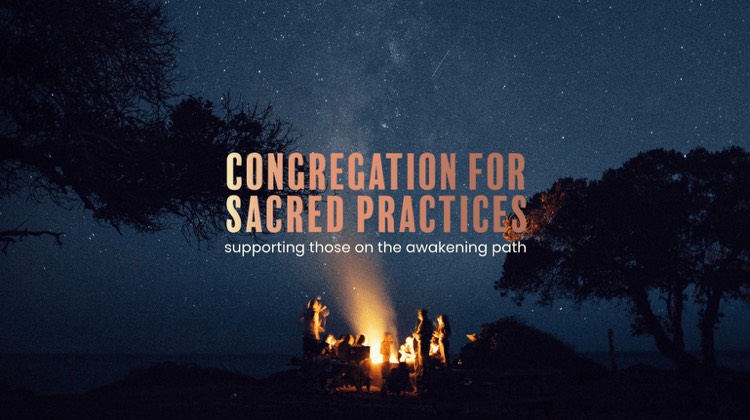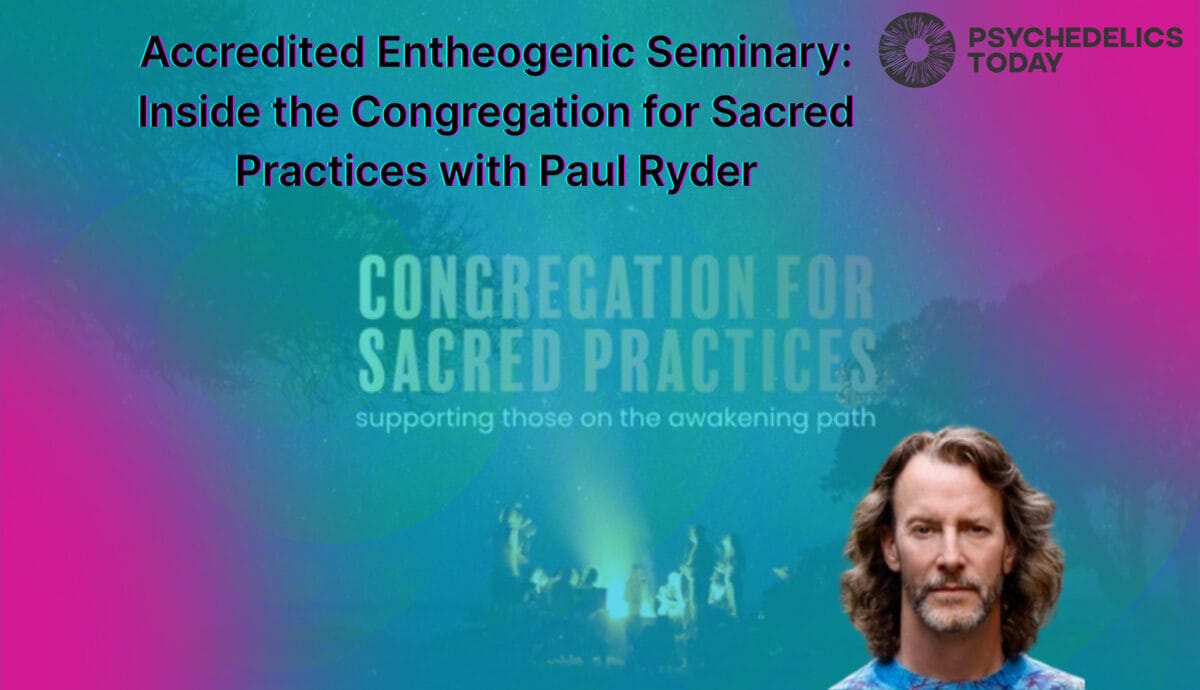Last week, Investigative Reporter and Psychedelic State(s) of America founder Jack Gorsline sat down with Paul Ryder, Founding Minister of the Congregation for Sacred Practices, as part of PSA’s ongoing Advocacy Spotlight Initiative, powered by Psychedelics Today and Lucid News – to discuss the CSP Seminary’s recent precedent-setting accreditation approval from the Global Accreditation Council (GAC), based in The Hague, Netherlands.
Stay tuned for PSA’s forthcoming companion column exclusively via Lucid News in the days ahead, but for now, enjoy the following Q+A featuring Ryder on the past, present, and future of the Congregation for Sacred Practices’ seminary and general community building efforts.
“We see awakening as a process, not a creed.”
Jack Gorsline: Paul, thank you for joining me. To start, could you share what first got you involved in the psychedelic space and how that led to the founding of the Congregation for Sacred Practices (CSP)?
Paul Ryder: Thank you for having me, Jack. My journey began over a decade ago when I started working with an underground guide, as many do. At the time, I was a business school professor at the University of San Francisco, running their executive MBA program. After about two years of journeys, I asked him how he learned to do this work. He directed me to a training and off we went. I had some free time on weekends, so I began sitting for friends and then folks started showing up. As I continued, more people started coming to me, especially after Michael Pollan’s book came out. What began as a side project quickly became a full-time calling.
Initially, I always held these substances as sacraments, experiencing them in the context of spiritual opening and ritual. What I noticed after Pollan’s book came out was that people were coming to me with specific issues like anxiety or depression, seeking therapeutic outcomes. A different conversation had entered my consulting room and I realized there was a shift toward a psychomedical model, which didn’t align with my experience or interests. Rather than just critique this trend, I decided to found an organization that would serve as a counterbalance, affirming the spiritual and communal aspects of this work.
Jack Gorsline: How did you go about establishing CSP as a religious organization?
Paul Ryder: It was a mix of inspiration and practical steps. I had been running events for underground guides and wondered if we could become a religion. There was some resistance, especially from those with religious trauma, but the idea persisted. As I completed my doctoral work in mythology, psychology, and religion, it became clear to me that this was fundamentally a religious practice.
We named it the Congregation for Sacred Practices, not the Congregation for Sacred Medicine, because we wanted to include a wide range of spiritual practices—breathwork, meditation, sound baths, community events, and more. The process of becoming a church involved a lot of paperwork, including a 70-page application to the IRS for 501(c)(3) status. We worked with consultants and attorneys to ensure everything was done properly. The IRS, not a religious office, determines tax-exempt status, which was an interesting aspect of the process. In retrospect, it’s comforting to know that our government takes the separation of church and state so seriously that there’s not an “office of religion” that you apply to.

Jack Gorsline: What are the core beliefs of CSP?
Paul Ryder: We have four core beliefs: that all humans have the capacity for awakening; that the divine is present in every life; that sacraments and spiritual practices accelerate awakening; and that awakening is about becoming more present, loving, and engaged with life. We see awakening as a process, not a creed, and our role is to help people clear the noise in their lives so they can connect with the divine, however they define it—God, source, spirit, or life force.
Jack Gorsline: CSP recently became the world’s first accredited seminary for entheogenic studies. Can you tell us about the accreditation process and why you chose the Global Accreditation Council (GAC)?
Paul Ryder: My background in higher education made me aware of how accreditation can sometimes distort an institution’s mission. I saw it happen up close at USF. We wanted an accrediting body that would support our unique field—entheogenic ministry—without forcing us into traditional academic boxes. The GAC, based in the Netherlands, is focused on innovative, hybrid, and online education, which aligns with our approach. They also foster a community of accredited organizations that share best practices, rather than just issuing a stamp of approval and moving on.
Our partnership with Ubiquity University allows us to offer advanced degrees in Ministry (M.Div., D.Min.) and Entheogenic Studies (M.A., Ph.D.), with a four-year experiential minister training program. The curriculum combines coursework, seminars, and hands-on practicum, and includes a bridge program for experienced guides. What’s unique in our program is that we are able to provide practice sessions with live sacrament. I don’t know of many other programs that can do that.
Jack Gorsline: How does CSP approach training and community building?
Paul Ryder: Our minister training is a four-year program, starting with foundational coursework in spiritual direction, preparation, and integration. Only after developing personal practices and ethical grounding do trainees work with live sacrament, primarily MDMA and psilocybin, which we find to be accessible and appropriate entry points. The final two years involve supervision and mentoring.
We currently have about 100 students and 60 licensed ministers across the U.S., serving around 1,000 members through individual and group ceremonies. Community is central to our work—healing and awakening happen in relationship, and we strive to connect people on the same path. We also offer a range of community events, from potlucks to sound baths, many of which are free or low-cost to ensure accessibility.
Jack Gorsline: How does CSP ensure safety, ethics, and legal compliance?
Paul Ryder: Safety and ethics are paramount. All ministers are required to follow strict protocols for medicine storage and record-keeping, and we have a medical team available for consultation. We maintain a code of conduct and an ethics committee to handle any concerns, with a transparent process for complaints and accountability. Our approach is both restorative—we aim for learning and improvement for all concerned—and firm—three substantiated complaints result in loss of licensure.
We comply with RFRA—our beliefs are sincerely held, our programs are designed and monitored to be safe for members, and we take every precaution to prevent diversion of sacramental substances.
Jack Gorsline: What are CSP’s plans for the future?
Paul Ryder: With accreditation, we’re expanding our seminary to offer more educational programs for both ministers and laypeople interested in the awakening path. We’re also looking to raise funds to support programs for underserved populations, such as veterans, BIPOC, LGBTQ+, and single mothers. With 60 working ministers and more on the way, our scale allows us to make a significant impact if we can secure funding for these initiatives.
We’re considering establishing a dedicated space and possibly endowing professorships to further our mission. Anyone interested in supporting this work—especially those who might want to endow the first entheogenic chair at a seminary—should reach out. Fundraising is a key focus as we look to grow our capacity and serve more communities.
Jack Gorsline: Where can people learn more or get involved?
Paul Ryder: Visit sacredpractices.org for information about our seminary, minister training, community events, and applications. We’re always looking to connect with those interested in this work, whether as students, community members, or supporters.


